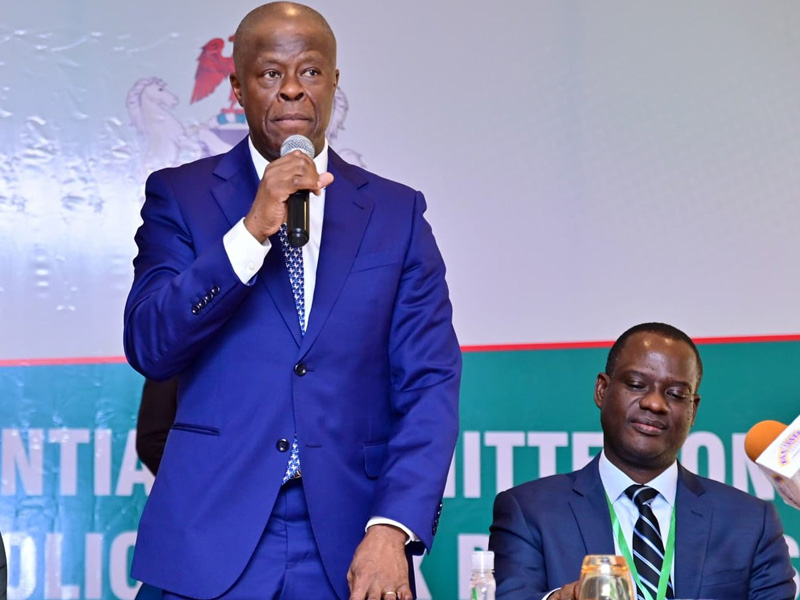Business
Nigerian Officials Confirm No Immediate 5% Fuel Tax Implementation

The Nigerian government has assured citizens that there are no immediate plans to implement the proposed 5% fuel tax, which has been a point of contention amidst rising living costs. During a press conference held on October 10, 2023, the Minister of Finance and Coordinating Minister of the Economy, Wale Edun, and the Chairman of the Presidential Committee on Fiscal Policy and Tax Reforms, Taiwo Oyedele, addressed concerns regarding the tax, clarifying that it will not take effect on January 1, 2026, as previously speculated.
Edun emphasized that while the Tax Administration Act is set to become operational on the aforementioned date, the implementation of the 5% surcharge is not automatic. “The tax reform bills and the tax act will not become operational until January 1, 2026. The 5% fuel surcharge, which is mentioned therein, will not automatically come into effect,” he stated. This clarification comes as the Trade Union Congress of Nigeria (TUC) issued a 14-day ultimatum to the government, demanding a retraction of any plans to introduce the surcharge or face potential economic shutdown.
Clarification on Tax Administration Act
The Finance Minister explained that the surcharge is a longstanding provision initiated under the Federal Road Maintenance Agency (FERMA) Act in 2007, and its inclusion in the 2025 Act is aimed at consolidating existing laws for clarity and compliance. Edun noted that 40% of the revenue generated from this user charge would be allocated to FERMA, with the remaining 60% directed to state road management agencies.
“This is critical not just for the safety of lives and property but also for economic growth, as goods are largely delivered through our road networks,” he added. Edun underscored the importance of distinguishing between the inclusion of the surcharge in the new tax legislation and the immediate introduction of a new tax, reiterating that “the government is fully aware of the economic pressures of the time and will not take decisions that will make things even more burdensome.”
Oyedele also addressed the issue, reinforcing that no specific date has been set for the implementation of the surcharge. He indicated that any such tax would require a formal commencement order from the Minister of Finance, which must be published in a gazette to take effect. “Nobody will just spontaneously introduce the tax and create problems for the system,” he stated during an interview on Channels Television.
Concerns on Infrastructure and Economic Burden
While the proposed fuel surcharge aims to generate revenue for Nigeria’s deteriorating road infrastructure, Oyedele clarified that it is not intended to add financial strain on households. He pointed out that the original plans by FERMA to collect the tax directly were halted, emphasizing that the current government is committed to managing the implementation carefully.
Oyedele further criticized the TUC’s threat to strike over the issue, arguing that the surcharge was introduced by a previous administration and not by President Bola Tinubu‘s government. “The TUC should have complained when this was introduced in 2007, not now,” he stated.
Addressing concerns about inflation, Oyedele acknowledged the significant impact of poor road conditions on the economy. He remarked that Nigeria has approximately 200,000 kilometers of roads, of which only 60,000 are paved. This situation elevates logistics costs and creates inefficiencies in the transportation of goods and people. “The surcharge will help the government with funds to maintain the roads,” he assured.
Despite public worries regarding potential inflationary effects of recent tax reforms, both Edun and Oyedele remain optimistic about the government’s focus on enhancing tax governance and infrastructure. They advocate for patience as these reforms are expected to yield long-term benefits, including improved public services and economic stability.
In conclusion, the Nigerian government seeks to clarify misconceptions surrounding the proposed 5% fuel surcharge while emphasizing its commitment to addressing pressing infrastructure issues without imposing immediate financial burdens on its citizens.
-

 Health3 months ago
Health3 months agoNeurologist Warns Excessive Use of Supplements Can Harm Brain
-

 Health3 months ago
Health3 months agoFiona Phillips’ Husband Shares Heartfelt Update on Her Alzheimer’s Journey
-

 Science1 month ago
Science1 month agoBrian Cox Addresses Claims of Alien Probe in 3I/ATLAS Discovery
-

 Science1 month ago
Science1 month agoNASA Investigates Unusual Comet 3I/ATLAS; New Findings Emerge
-

 Science4 weeks ago
Science4 weeks agoScientists Examine 3I/ATLAS: Alien Artifact or Cosmic Oddity?
-

 Science4 weeks ago
Science4 weeks agoNASA Investigates Speedy Object 3I/ATLAS, Sparking Speculation
-

 Entertainment4 months ago
Entertainment4 months agoKerry Katona Discusses Future Baby Plans and Brian McFadden’s Wedding
-

 Entertainment4 months ago
Entertainment4 months agoEmmerdale Faces Tension as Dylan and April’s Lives Hang in the Balance
-

 World3 months ago
World3 months agoCole Palmer’s Cryptic Message to Kobbie Mainoo Following Loan Talks
-

 Science4 weeks ago
Science4 weeks agoNASA Scientists Explore Origins of 3I/ATLAS, a Fast-Moving Visitor
-

 Entertainment4 months ago
Entertainment4 months agoLove Island Star Toni Laite’s Mother Expresses Disappointment Over Coupling Decision
-

 Entertainment3 months ago
Entertainment3 months agoMajor Cast Changes at Coronation Street: Exits and Returns in 2025









